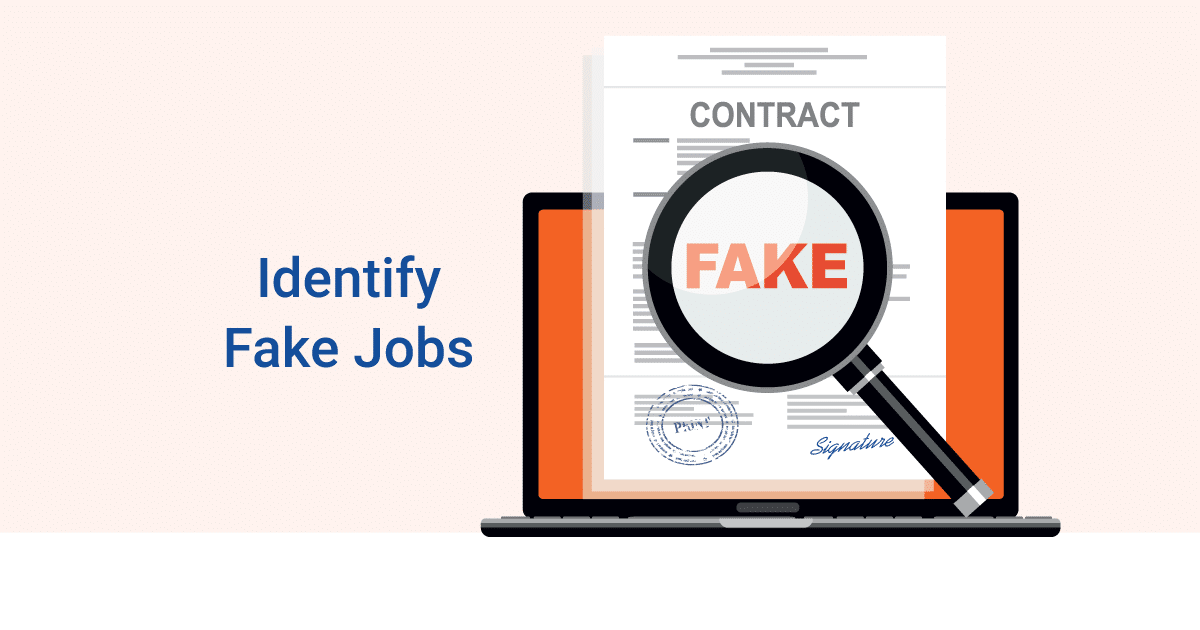Fake jobs come in various forms but they all have one thing in common; they all carry an end product of deceit and disappointment.
In 2015, Vanguard newspaper reported that 80% of online jobs in Nigeria are fake jobs.
The truth is that fake jobs do not manifest out of thin air. They are engineered by men, women and organisations who use it as a tool of deceit. While some use it as a bait to lure job seekers into believing they are what they are not, others use it purely for financial exploitation.
Meanwhile, there are those who use fake jobs to sow seeds of destruction in the lives of innocent job seekers. An example of this is seen in this harrowing experience of a Nigerian lady.
In Nigeria, fake jobs are clad in different names; from scam jobs, fake jobs, scam recruiters, fake recruiters and many other unpleasant monikers they have been branded over the past years.
In this article, we will share some of the fastest ways to identify fake jobs and scam jobs in Nigeria. We will also share samples of messaging templates used to promote fake jobs in Nigeria.
Table of Contents
What are fake jobs/scam jobs?
A fake job or scam job is a job that is not genuine. In other words, it is an imitation of a real job, a counterfeit. It is always made to look real in order to deceive people. In three words, it is a sham.
Sadly, individuals who perpetrate scam jobs and fake jobs will go to extreme lengths to make these jobs look authentic. The reason is simple.
The more genuine a fake job appears, the higher the chances of scamming the intended target; usually job seekers including individuals hunting for better jobs.
Now that we have established what a fake job is, let us proceed to look into the fastest ways to identify fake jobs and scam jobs in Nigeria.
Types of Fake Jobs and Scam Jobs
There are usually three kinds of scam jobs as mentioned earlier.
Deliberately misleading job openings
These are fake jobs that lure job seekers into overly different agenda. For instance, these are the types that would invite you for an interview that turns out to be a multi-level marketing seminar.
False representation with intent to defraud
This is where you find fake jobs from scam recruiting companies who take advantage of desperate job seekers and eventually strive to exploit their desperation by asking them to pay for a job slot.
Impersonators
The extreme kinds of fake job scams are those that claim to be an existing company by impersonating them. Here the individuals set up fake social media accounts and claim to be hiring in a bid to get unsuspecting candidates to pay for job opportunities that do not exist.
Fastest Ways to Identify Scam Jobs in Nigeria
As job seekers continue to get smarter and spot loopholes in fake jobs, the brains behind these schemes have also upgraded their parameters of deceit.
The implication is that the forms that fake jobs and scam jobs take are consistently being improved upon by the devious minds involved. We have, therefore, taken it upon ourselves to also expose fake jobs as seen in the sample templates and tips we will share in subsequent lines.
Below are some of the fastest ways to spot fake jobs and scam jobs:
- Company has no credible online presence
- They eventually ask for money
- The messaging template
- Job interview versus job briefing
- Venue of the interview
- No specific title
No Credible Online Presence
Companies that are involved in fake jobs and scam jobs usually will not have any credible online presence. This means that for instance, they will not have a website, blog or any online presence that can be verified.
In this digital age where you would expect any organisation with a legitimate organisational setup to have an accessible online presence, companies that promote fake jobs and scam jobs fail woefully on this scorecard.
In most cases, they do not have visible websites or social media pages/accounts. However, you should bear in mind that there are organisations that have still not fully transitioned into having an online presence.
They Eventually Ask For Money
Don’t pay to get a job. It’s that simple. At some point, the fraudulent promoters of fake jobs and scam jobs eventually ask for some form of payment to get the candidates jobs. In this case, they have various names for the fees they eventually request from candidates. Some of these names include processing fee, registration fee or even consultancy fee.
No genuine organisation should ask for money from candidates to help them get jobs.
The only exceptions are career-driven organisations that offer customised services to clearly defined categories of top professionals to aid their job search.
The Messaging Template
If you find yourself being invited for a job interview or job assessment exercise in a company for a job role that you do not recall applying for, it becomes imperative for you to carry out a research into the company.
When you get invited to this interview, the invitation is usually sent either via email or SMS. If it is an SMS, you should pay great attention to the format of the message as well as the message it contains.
Below are 12 messages (SMS) that turned out to be scam interviews as affirmed by candidates who sent these messages to Jobberman as a warning to others:
A Nigeria-based HR professional, Isiakpona Nwabueze, while speaking to Jobberman on ways to spot a fake job, shared some insights.
“Unlike what has become prevalent today, an ideal job invitation should come via three channels; a phone call, an email and a text message. Text messages do not work in isolation.
The company hiring would call, send an email and then follow up with a text message. Sending an SMS only is a sign that it is most likely a fake job or scam job.
The only exception would be a text message that is very detailed. Such messages have the name of the company and a number to call. But generally, any company that is worth its salt would not send an sms in isolation; not even for the position of a cleaner.
Like we mentioned earlier, a serious company would put a call through to the candidate, send an email and then might send an SMS.
Job Interview Versus Job Briefing
By structure, an interview constitutes a stage in the recruitment process. It is not an exercise that operates in complete isolation.
To get invited to an interview, the recruiting company must have received your application or CV.
In some cases, you are recommended for the role by someone who has worked with you in the past of by your profile on websites like LinkedIn.
While hunting for a job, you must be wary of job interview invitations and how they are drafted. In a lot of scam job interview invitations, the flaw sometimes appears in the sloppy use of terms.
When hiring, a job interview should precede a job briefing. This is the point where we define what a ‘job interview’ is as well as what a job briefing is.
A job interview is a conversation between a representative of an organisation and a potential employee to assess his/her suitability for a particular job.
A ‘job briefing’ on the other hand, is the process of outlining clearly the full description of tasks and responsibilities of an employee to him/her.
As highlighted earlier, a job interview always precedes a job briefing. Therefore, a message from a potential employer inviting you to a job briefing for a job you never applied for without an interview should draw some suspicion.
Venue of the Interview
Not all interviews are conducted within the office space of the recruiting company. This is evidenced by Skype interviews, career fair interviews, telephone interviews, lunch/dinner interviews and a few others.
However, if an interview is to be conducted in an office by the recruiting company, then you should pay attention to the venue.
In a situation where you are invited to an interview and asked to sit outside a building without any recognisable official representation, you should be worried. In Nigeria, we have had candidates invited to interviews and had to sit outside unconventional and sometimes suspicious-looking structures.
“Some people invite candidates for a job or job assessment as if an interview has already taken place. That is not a real job. Some even go as far as saying they have assessed your credentials, which you never sent in.
Another way to spot a fake job is the company name. Some company names sound funny and this is the point where you want to do your research on the company,” a recruitment consultant based in Lagos, Michael Ogunbanwo told Jobberman.
No Specific Title
All genuine jobs would have specific titles but for fake jobs, this is missing. Ogunbanwo had a few insights to share on this.
“A fake job would not have a specific job title. They just talk about having openings in XYZ location. A real job has a specific job title> It could read ‘Looking for a Content Manager, Operations Head and the likes.’ Fake jobs never have descriptions of the company. Thirdly, they must have specific locations.”
According to Ogunbanwo, another way to spot a fake job is that the ranges of the level of experience required are too wide.
“When you see a company that puts up a job opening saying it needs people with 2-15 years of experience, that raises a straight red flag. Simple logic shows that 2 years and 15 years are not the same. In fact, they are too far apart. A real job would either want a senior person or someone with minimal work experience. It is desperation that makes candidates fall into the traps of fake jobs and scam jobs.”
Conclusion
Before you attend any job interview you have been invited for, be sure to do the following:
- Research the company to ascertain it is an authentic company
- Avoid desperation
- Check your email’s inbox and spam for a corresponding invite
- Check your call log for possible missed call from the company
- Don’t pay for a job
- Use real job-based websites like Jobberman
- Be wary of companies that use free email accounts like Yahoo, Gmail instead of corporate email accounts
- Avoid companies that bypass interviews and offer immediate employment
- Be very vigilant when attending interviews
- Let your guardian or friends know the venue of interviews you attend







